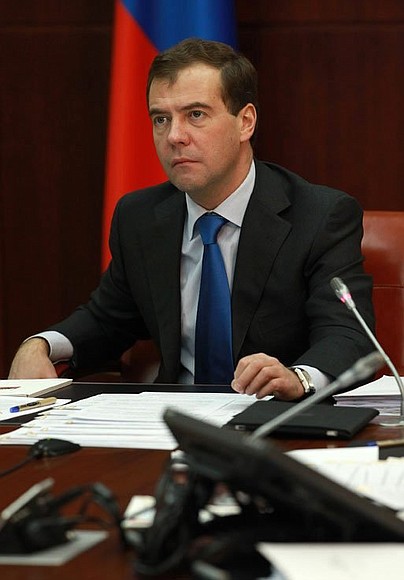
Deputy Chief of Staff of the Presidential Executive office Alexander Beglov: Mr President,
In accordance with your instruction of December 28, 2009, we have opened 83 Presidential reception centres in each of Russia’s federal constituent entities. And today, in accordance with your instructions, we are continuing work on opening electronic reception centres in 48 Russian federal constituent entities. All your representatives in the Presidential reception centres in the regions have been appointed. Today, they have invited citizens to these centres for a single personal reception. Your instructions have been fully carried out.
President of Russia Dmitry Medvedev: I would like to address those people who will be working in these reception centres. I hope that in your work you will be attentive and understanding. There are many problems in our nation. People will come to you to make appeals to me, but naturally, you will be the first to collect all the information. Then, this information will be processed; you will be able to resolve some of the issues yourselves, while others might require involvement by the federal centre, or perhaps even my personal attention. In any event, this is another channel for communicating with our citizens, our people. I hope that it will be effective, that it will bring results, and that any appeal to the President of the Russian Federation will be treated appropriately. And as a result of carrying out these instructions, requests made by our people will be fulfilled. In any case, that should be the goal. Thus, I wish you success and hope that your work will be effective, bringing good results.
We can start working. Everyone can see and hear us. Good afternoon, colleagues.
We are now communicating with practically our entire nation. For the first time ever, we are holding a single day to receive citizens at all 83 of our presidential reception centres – one in each federal constituent entity. I just said a few words to the reception centres’ heads. They need to be very attentive and sensitive to people’s requests.
You know that the number of appeals addressed to officials at all levels – and especially to the President – is growing. That is the nature of our power structure. People write to us about a wide range of problems, including some very acute and urgent ones. I consider working with citizens’ letters and appeals to be exceedingly important in all forms, whether through face-to-face meetings, on paper, or electronically.
A large part of appeals addressed to me concern the provision of housing, social matters, and housing and utilities. There are many appeals of this kind. First and foremost, people are concerned with the growth in housing and utility costs. There are also complaints about disruptions in gas, water, and heat supply, and the lack of capital repairs in residential buildings. The majority of these complaints – let’s be straightforward, about 90 per cent – fall under the jurisdiction of regional and municipal authorities. Indeed, they are the ones who should be taking care of these issues. I specifically focus attention on this topic today so that all my colleagues who deal with these matters at the level of regional authorities make this work a priority. If I am spending time on it, then you should certainly be working on it as well. We understand how important it is to reform housing and utility services sector and make it work effectively. And tomorrow, Russia’s State Council Presidium will be looking into this very subject.
I would like to make note of another issue. Approximately one third of these appeals comes from retirees – in other words, the group of citizens that is least advantaged and, unfortunately, not the best protected. We must react to these appeals immediately, because caring for our elderly is an absolute priority.
What do many people complain about? They complain about authorities, the formal approach to their complaints and letters. Heads of local government bodies and regional governors must specifically monitor these appeals. In general, it is time to ensure that such appeals involve a direct reaction by civil servants, and in cases when these servants refuse to reply or to resolve problems in a timely manner, disciplinary and administrative measures might be taken.
We need to pay attention not only to observing deadlines, but to the way these appeals are reviewed as well. We know what happens in practice. People write to the very top: to the President or the Cabinet. As a result, complaints follow the chain to the very bottom, to the head of the local government, and then, a formal reply is given. We shouldn’t have this. Even if a problem cannot be resolved immediately, it is important to explain to people why it cannot be done today, rather than simply brushing them aside. Deadlines are extremely important here. Indeed, it is a matter of administrative culture. We absolutely need to reply within the set deadlines, reply substantially and on time.
I will note that recently we changed our approaches to working with citizens’ appeals. We created a unified system of the Presidential reception centres, and today, as I mentioned, these reception centres have opened in every Russian federal constituent entity. Naturally, this involves greater responsibility for everyone working on this project.
It is also important for people making requests to be able to monitor the progress of their appeals. This opportunity should be provided through electronic media and information technologies, including the President’s official website.
In addition, during this first phase, many of the federal constituent entities – 48 to be exact – will also introduce so-called electronic reception centres. This, too, is very important, because first of all, it involves modern work technologies. They do not make people to wait in long lines or take trips anywhere. It is enough to submit an appeal in an electronic format to have your complaint or appeal registered. We also need to set up an information exchange between the Presidential reception centres and state and municipal services centres that are being created in the regions. This will greatly reduce the time needed for consideration of appeals and make monitoring easier.
That’s all that I wanted to say at the very beginning as to how we should organise our work. Now, let’s begin receiving citizens.
<…>
